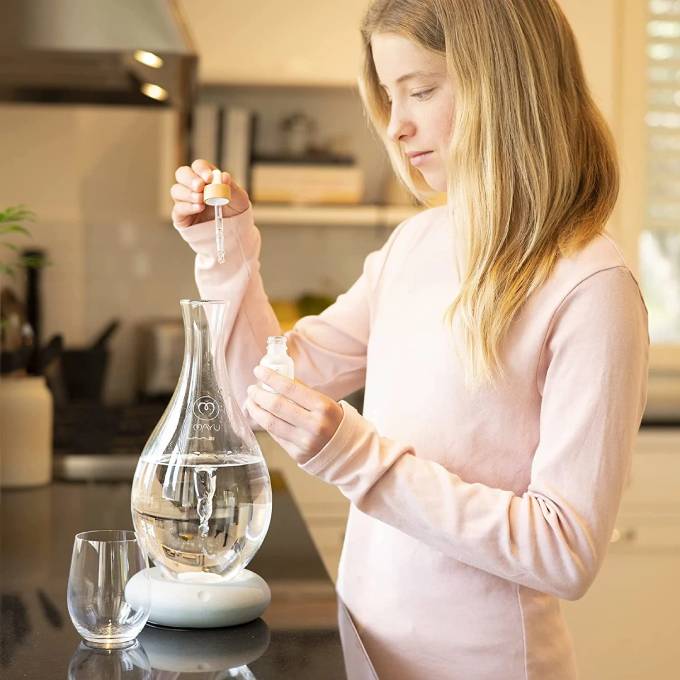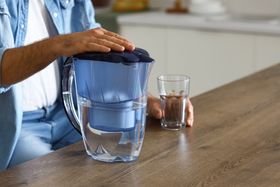Reverse Osmosis vs. Distilled Water: Which Is Better for You?
Confused about reverse osmosis and distilled water? Explore our guide to understand their benefits and determine which is the better choice for you.
Updated March 24, 2025

Tired of worrying about the quality of your drinking water? Confused about the differences between reverse osmosis (RO) and distilled water?
With countless water purification options flooding the market, it's tough to determine the best choice for your household. Both RO and distilled water promise clean water, but which one truly delivers?
In this article, we'll dive deep into water purification, exploring the pros and cons of RO and distilled water. We'll discover which method is best suited for your specific needs.
RO vs. Distillation: Overview of the Process
Reverse Osmosis
Reverse osmosis uses a special filter to remove impurities. This filter, called a semipermeable membrane, only allows water molecules to pass through. When water is pushed through this filter with high pressure, the contaminants like salt, chemicals, and germs are left behind.
The step-by-step process is as follows:
- Pretreatment: First, water passes through a filter that traps dirt and rust. Then, it goes through a carbon filter to remove chlorine and other harmful chemicals.
- Pressure Application: Water is forced through a special filter using high pressure.
- Filtration Through Membrane: The filter only lets water molecules pass through, trapping contaminants like salt, heavy metals, and bacteria.
- Wastewater Discharge: The leftover water with the impurities, called brine, is flushed away. This brine is about 3–4 times more than the clean water produced.
- Post-Filtration: The clean water then passes through another carbon filter to improve its taste and remove any remaining impurities.
- Storage: The clean water is stored in a tank for use.
- Final Filtration (Optional): Before dispensing, water may pass through a final polishing filter for enhanced purity and taste.
» Tap water got you feeling uneasy? Discover the perfect water filter pitcher
Distillation
Distillation, on the other hand, purifies water by boiling it into steam and then condensing the steam back into liquid water. This process separates water from impurities because water boils at a lower temperature than most contaminants, like salt and metals.
Here's how the process works:
Heating: Water is heated to its boiling point, turning it into steam.
Evaporation: As the water evaporates, contaminants and minerals are left behind.
Condensation: The steam travels through a cooling coil or chamber.
Cooling: The steam cools and condenses back into liquid water.
Collection: The purified water drips into a clean container.
» Discover simple, natural ways to soften hard water at home
RO vs. Distilled Water: Key Differences
Efficiency of Contaminant Removal
RO Water
RO is great at removing dissolved salts, heavy metals, and some microorganisms. But, it's less effective at removing volatile organic compounds (VOCs) and certain chemicals like chlorine, which can pass through the membrane.
Distilled Water
Distillation is very effective at removing VOCs and microorganisms because it separates substances based on their boiling points. But, it may not remove contaminants that have similar boiling points to water, like some pesticides or volatile solvents.
Winner: Both RO and dIstilled water
» Transform ordinary H2O into structured water at home
Use In Daily Life
RO Water
RO water filters out most impurities and minerals, but a small amount remains. This makes it healthier for long-term use than distilled water, even though it still has fewer minerals than natural water. Because of these remaining minerals, RO water tastes slightly better. Many people also add minerals back to RO water to improve its health benefits and taste.
RO water is a good balance of purity and safety for everyday drinking. For skincare, RO water is gentle and effective at removing impurities, and it may be less drying than distilled water. It can help prevent skin irritation caused by hard water minerals and improve the effectiveness of skincare products.
In appliances, RO water helps prevent limescale buildup, extending the life of kettles, coffee machines, and irons. But, drinking it over a long period might require adding minerals back to maintain a healthy balance of electrolytes.
Distilled Water
Distilled water is completely pure, meaning it has no minerals. This makes it less ideal for drinking regularly, as it can lead to mineral deficiencies.
For skincare, distilled water is very pure and gentle, making it great for sensitive skin. It cleanses without leaving any residue, reducing the risk of irritation. But, because it lacks minerals, it might dry out the skin slightly.
In appliances, distilled water is excellent at preventing limescale buildup, which is beneficial for steam irons and humidifiers. But, if you drink distilled water for a long time, you might need to take supplements to get the minerals your body needs.
Winner: RO Water
» Discover easy tips to make your RO water more alkaline
Taste and Mineral Content
RO Water
RO water often tastes neutral because most dissolved salts and impurities have been removed. While it retains some minerals for a slightly better taste than distilled water, it lacks essential minerals like calcium and magnesium.
Minerals can be added back to RO water to improve taste and health benefits. Its high purity makes it ideal for cooking, where you want to preserve the original flavors of food, and for drinking, especially in areas with contaminated water sources.
Distilled Water
Distilled water is completely pure, meaning it has no minerals or impurities. This makes it taste very bland or flat. Because it lacks electrolytes and minerals, it's not recommended for long-term drinking as it doesn't provide essential nutrients.
But, its purity is beneficial for applications requiring mineral-free water, such as medical equipment, laboratory work, and cooking delicate dishes where mineral interactions can affect flavor.
Winner: RO Water
» Is your water truly hydrating you? Not all H2O is created equal
Environmental Impact
RO Water
RO systems often waste a significant amount of water, typically between 20% and 50%, as concentrated "brine." They use moderate amounts of energy to pressurize water through membranes.
While more sustainable than older methods, RO systems still require careful management of brine disposal to protect the environment. Sourcing sustainable materials for membranes and components is also important.
Compared to distilled water, RO water is slightly less pure but requires less energy for heating and treatment. This makes also it more energy-efficient and cheaper to produce.
» Is your water acidic? Balance the pH for optimal hydration
Distilled Water
Distillation requires a lot of energy to heat water into steam and then cool it back into liquid. This process can create very pure water without much waste, but it uses a lot of energy, often from fossil fuels, which harms the environment. Using renewable energy, like solar or wind power, can help reduce this impact.
While distillation doesn't directly waste water, it still relies heavily on electricity or fuel, which can harm the environment. To make distillation more sustainable, we need to find ways to use less energy and rely more on renewable sources.
Winner: RO Water
» Discover the best types of water to drink for optimal kidney health
Health Benefits
RO Water
Drinking RO water for a long time can lead to mineral deficiencies, such as calcium, magnesium, and potassium. These minerals are important for bone health, heart function, and overall body balance. Our bodies might try to compensate for low mineral water by excreting more minerals through urine.
Natural spring water typically has more calcium and magnesium than RO water. Over time, drinking less of these minerals could increase the risk of bone loss and high blood pressure.
Distilled Water
Distilled water doesn't have any minerals, so drinking it for a long time can lead to mineral imbalances. This could increase the risk of conditions like osteoporosis and high blood pressure.
Drinking water with low mineral content can cause mineral imbalances and decrease levels of calcium and magnesium, which can affect bone health and heart function. Distilled water can also be slightly acidic, which might affect digestion.
Your body might try to get minerals from your tissues to balance things out. To avoid these issues, make sure you eat a diet rich in minerals or drink water with minerals added back in.
Winner: RO Water
» Discover the surprising ways hard water can impact your health
Optimizing Water Usage: The Benefits of a Dual-Water System
Using both reverse osmosis (RO) and distilled water can offer significant benefits depending on your specific needs.
Here's how you can combine these methods in your household:
- Drinking and Cooking: RO water is a good choice for drinking and cooking. It effectively removes contaminants and is more energy-efficient than distillation. If necessary, consider using a remineralization filter to add essential minerals back to the water.
- Medical Devices and Appliances: Distilled water is ideal for CPAP machines, humidifiers, and steam irons. It prevents mineral buildup, ensuring optimal performance and longevity.
- Aquariums and Plants: RO water is suitable for aquariums and sensitive plants. But, you might need to add minerals back to the water to support their growth.
- Practical Implementation: A countertop RO system, like the one in the MAYU Full Cycle, is a convenient way to get filtered water for drinking and cooking. This can help reduce damage to appliances caused by mineral buildup.
» Learn what to do if you drank contaminated water
The Ultimate Water Showdown: RO vs. Distillation
The choice between RO and distilled water often depends on your specific needs and preferences.
While RO water offers a balance of purity and mineral content, making it suitable for everyday drinking and cooking, distilled water excels in specific applications like medical devices and laboratory work. But, long-term consumption of distilled water might lead to mineral deficiencies.
To elevate your water experience, consider incorporating the MAYU Full Cycle process. This innovative approach combines purification, remineralization, and aeration to deliver water that is not only pure but also revitalizing. By mimicking nature's water cycle, MAYU has the solution for optimal hydration.
Disclaimer: The information published by MAYU Water is not a substitute for the expert knowledge, advice, and recommendations of trained professionals. We strongly recommend consulting with industry experts and primary or scientific sources before making any health, research-related, or other important decisions.



















































